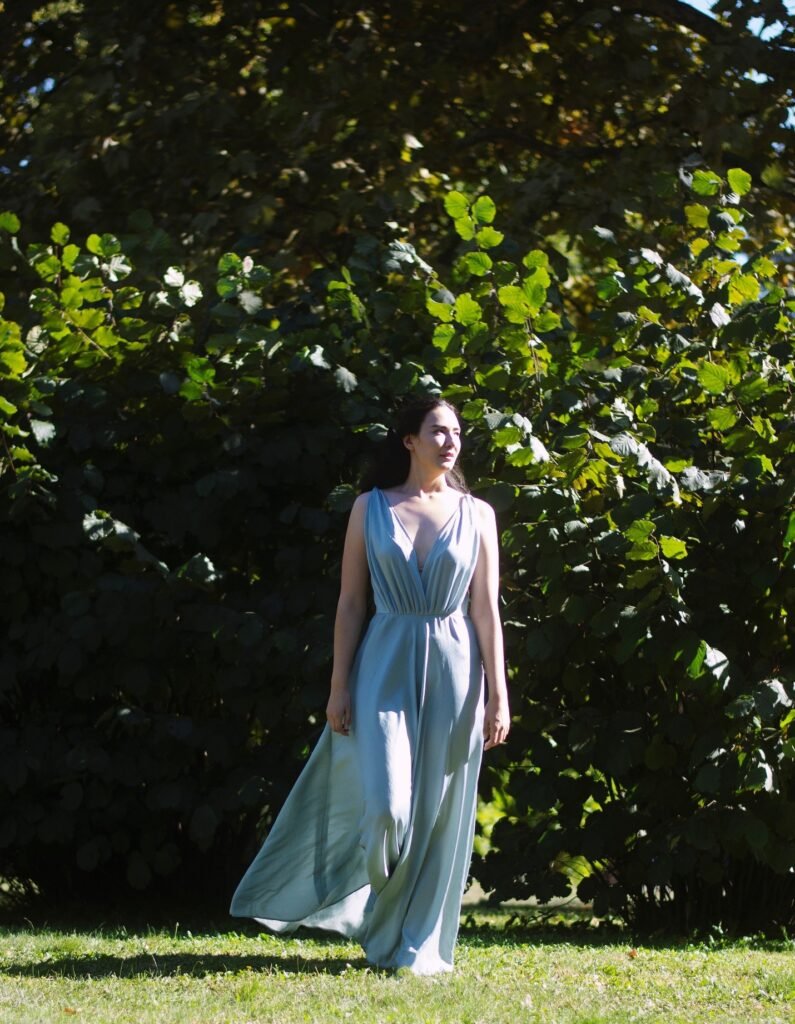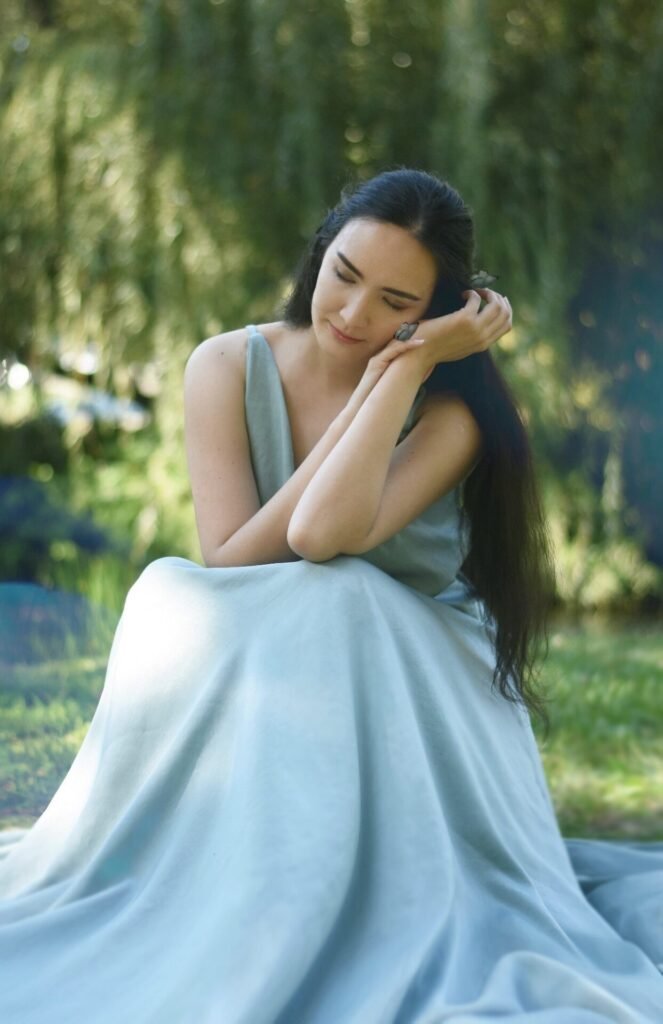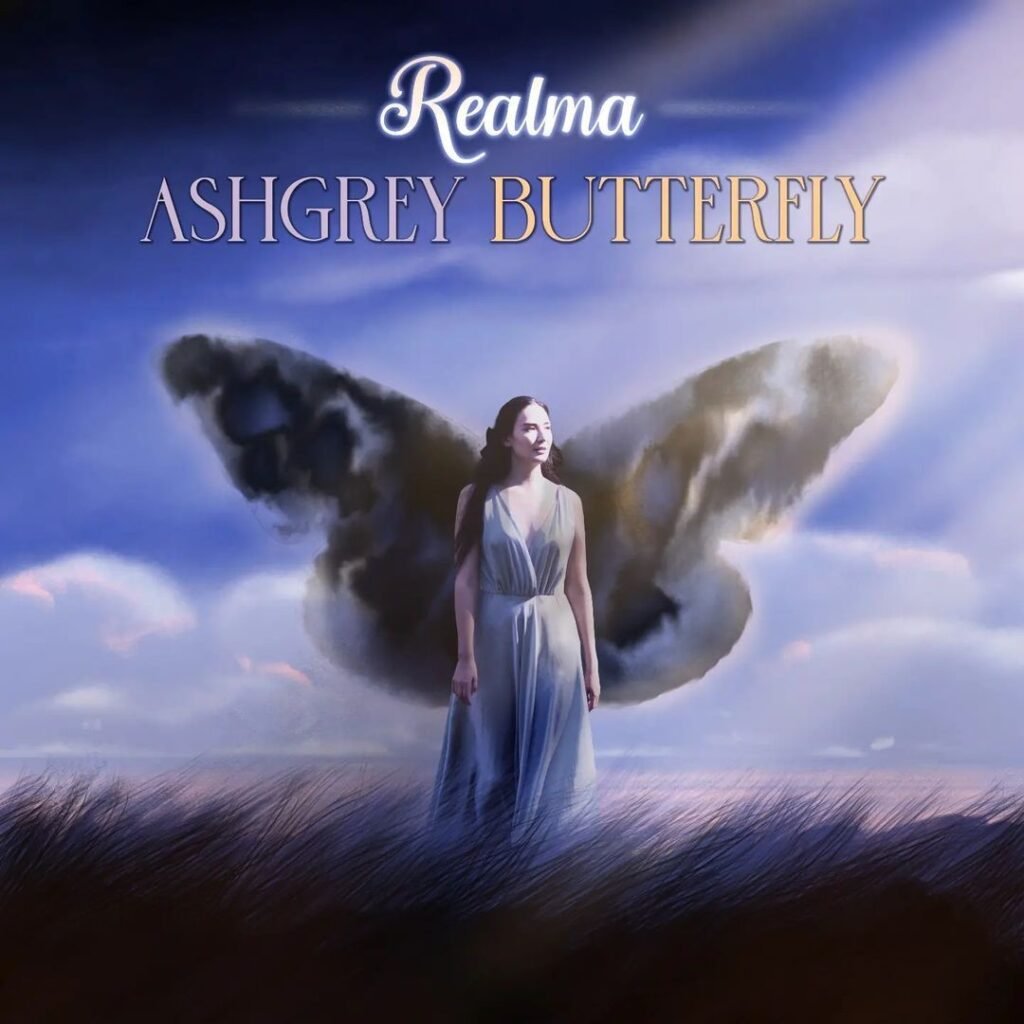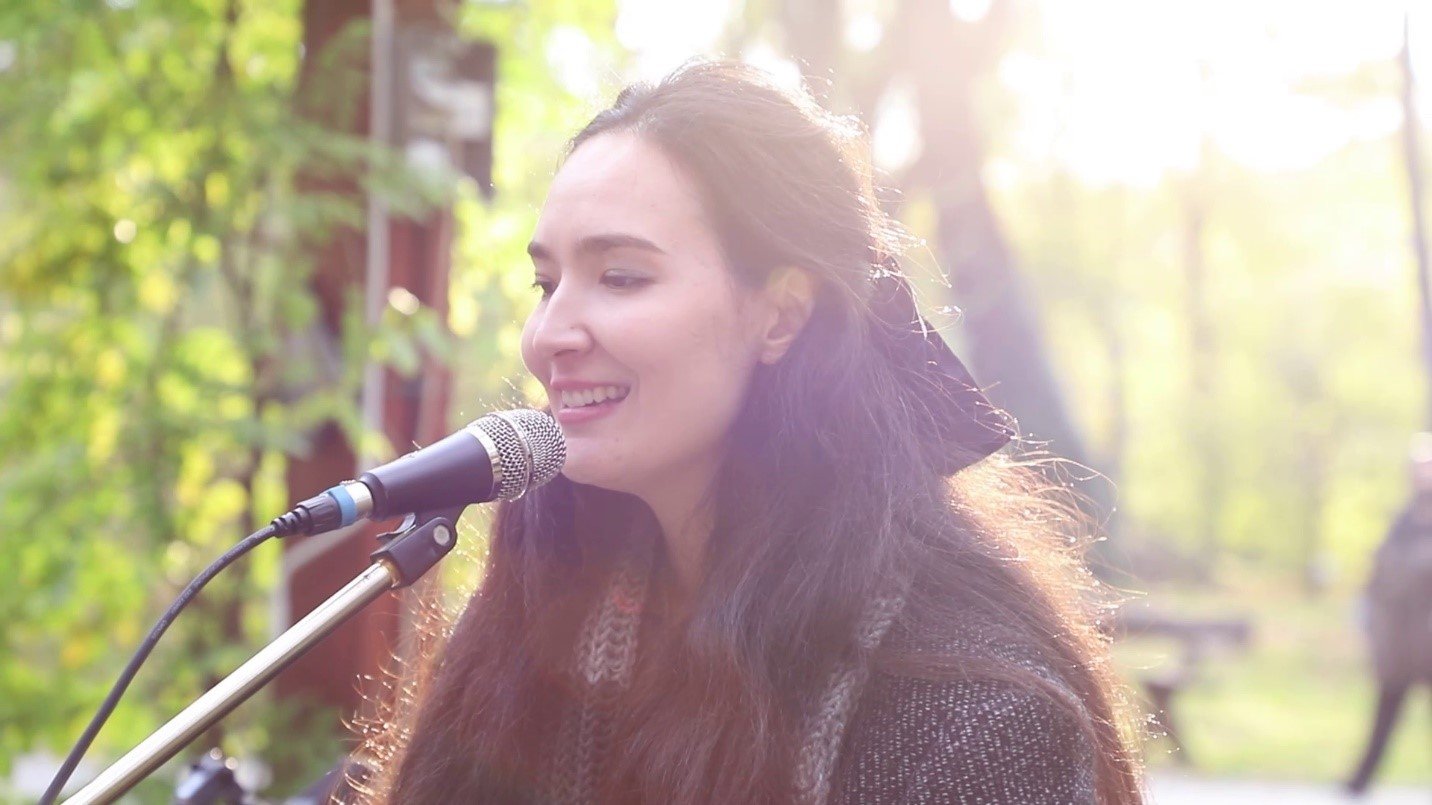An independent Serbian/Chinese polymodal artist goes by the name Realma. Numerous publications around the world, including Music Crowns, Calvert Journal, and Rolling Stone India, have all featured her music. Additionally, Realma has participated in numerous international film festivals, including Lift-Off Sessions, Flipbook Film Festival, Animest, and others with their animated music videos. Recent reviews of her performances have referred to them as “Eclectic, distinct, and multidisciplinary,” and she finished in the Top 3 of the MArte Live European competition semifinals.
Realma employs the art of songwriting as a transformative force of reverie and escape, confronting the mundane in all its light and dark hues with otherworldly sonority and narratives. Her songs express various themes through influences from various musical genres, much like the various realms reflected in a sorceress’s crystals. Realma’s music is atavistic and postmodern, gloomy and empowering, filmy and lifelike, and united by the pervasive witchy quality.
With a group of independent young artists from all over the world, the project is an ongoing audiovisual collaboration.
Realma’s third single, “Ashgrey Butterfly,” is adorned with a hint of psychedelic verve and beckons you into a fantastical world. Check out the song and the exclusive music video below:

1. Can you tell us a bit about where you come from and how it all got started?
REALMA: Yes, of course. I am half-Serbian and half-Chinese. I grew up in both countries and was lucky enough to have an amazing family that allowed me to cultivate my artistic skills and passions from early on. From music, oil painting and classical drawing to acting and dance classes, I was able to really delve into arts and creativity in both places. I later found film and drama to encompass the wide array of my eclectic interests, so I received BA joint-honors degree in these two areas at the University of Kent, UK. Though at that time, I was quite crazed for physical theatre and cinema, so I wasn’t really planning to go into independent music-making at all. Until Covid hit.
Long story short, I had a traumatic police mishandling in March 2020 upon my arrival from the UK back to Serbia. Together with a month-long self-isolation period, it really broke me as a person. It’s then I re-discovered the power of music in helping us transcend our given circumstances. That is when my multi-genre songwriting efforts provided me inspiration to dream about different realms, storyworlds and characters. With that said, the project also served as a remedy to re-claim my shattered identity, resulting in my punny witchy alias ‘Realma’.
There on, I started releasing my music and collaborating with the award-winning animator Mihajlo Dragaš, as well as artist Milica Staletović, who have supplied the visual identity to the audiovisual project and its disparate song realms. While our animations were included in some film festivals and the semifinals of MArte Live European competition, we’ve tried to make our live session videos interesting, shooting at culturally noteworthy locations like the UNESCO site Felix Romuliana and Botanical garden ‘Jevremovac’.
2. Did you have any formal training or are you self-taught?
REALMA: Yes, I did. Though my formal training hasn’t been as linear as it can be for some. My first instrument was accordion taught in primary school in Beijing, China, and I only played it briefly until I moved to Serbia and started studying classical violin at the local music school “Miodrag Vasiljević“ in my hometown, Bor. I was later preparing to enter music conservatoire with the amazing private tutoring from Sanja Jović, a soloist at the Symphony Orchestra of Niš and Bojan Stanković, who was providing me intensive lessons in counterpoint, harmony, musical form and composition. However, after some issues with my right arm, I’ve decided to study film & drama in the UK instead. Still, even there, I was actively engaged in the modules dedicated to the use of sound and music in theatre and cinema, often composing incidental pieces and soundscapes for our student productions.
In parallel with my main studies, I also completed a part-time composing and stylistic techniques course at OCA (part of UCA), as well as a singing and songwriting course at Pointblank School in London. In addition, I attended a summer school for musical theatre at Guildhall School of Drama and Music and received private lessons from the virtuosic pianist Ljubica Stojanović in London, who unlocked the expressive potentials of performance for me. Most recently, I’ve been increasingly interested in mixing and mastering, and I’ve completed a short summer course covering these two topics at ICMP this year. I also have plans to study mixing and mastering further at the Abbey Road Institute some time next year.
I have to say though, despite this varied training background, I often go my own way when I’m writing and producing music. In fact, as much as I enjoyed interpreting the works of different composers in my training, I’ve always found crafting my own pieces and arranging my own works to be the most freeing. I’ve always had a certain naturally experimental and playful edge that I don’t think was ever taught to me. That part is strictly my own, I believe.
3. Who were your first and strongest musical influences and why the name ‘REALMA’?
REALMA: I was very lucky to have inherited two distinct cultural influences from my home countries – China and Serbia, where I was quite privileged to have travelled to some remote areas, which allowed me to soak in some unique traditional folk influences. At the same time, my parents always loved listening to popular music, jazz, country, rock and many more genres at home. My mum is also an avid theatre lover, so she took me to all sorts of concerts, theatre, opera and ballet shows. So, naturally, I have my family upbringing to thank for, in terms of my instinctive appreciation of all music genres, and likewise, the multi-genre influences in my music.
Regarding the name ‘Realma’, I briefly touched upon my alias in the first question. But here, I can elaborate a bit further. Other than simply being this empowering entity that helped me transcend my dark circumstances, ‘Realma’ is also a figure that unites my songs. Because my music is manifesting quite divergent themes through a considerable array of distinct musical genres, I felt like an element was needed to fuse all the works and audiovisual realms together. And inspired by the alter egos of David Bowie and St Vincent, as well as the ethereal faun forms of artists like Goldfrapp, Kate Bush, Mitski and Bjork, ‘Realma’ ended up being this omnipresent witchy persona with the power to peek into the contrasting storyworlds of my songs. Like a sorceress gazing towards other dimensions reflected in her crystals. And of course, it’s also simply a pun on the word ‘realms’, which is very thematic with the whole project, ha ha.
4. What do you feel are the key elements in your music that should resonate with listeners, and how would you personally describe your sound?
REALMA: As for the key elements that should resonate with listeners, I hope it’s the honest emotional content, dreaminess and the cinematic touches that will inspire and touch the audience. On the other hand, I aspire for the complexity of my orchestral and synth textures to embrace the listener, to provoke and affect the person to dive deeper into the sonic realms I’ve painted in each song. Whether it’s the moon-charmed landscape of ‘A Hint of Pink’, the noir cityscape of ‘Wandering’, the vibrant fairyland of the current release ‘Ashgrey Butterfly’ or any other future vistas in my upcoming songs. Finally, there is also a narrative side to each song, which the music videos by my exquisite collaborator Mihajlo Dragaš re-contextualise in a unique way through animation, so I highly recommend their viewing.
As for my sound, I think with everything previously said in my answers, it’s no surprise that it’s quite a complex and distinct multi-genre brew. All in all, I’d describe my musical output as an eccentric fusion of elements that are at times a bit classical, at others a bit avant-garde, but are also deeply mystical and witchy. It’s like a florid kaleidoscope of art pop. I believe it’s also fair to say that my sound is very authorial, especially in the unlikely experimental elements I often select as motifs. Along these lines, my tracks are very cinematic and ambient in feeling too. Probably because I take considerable care to paint and highlight subtle atmospheres of the surrounding space of each production.

5. For most artists, originality is first preceded by a phase of learning and, often, emulating others. What was this like for you? How would you describe your own development as an artist and music maker, and the transition towards your own style, which is known as multi-genre cinematic alt-pop?
REALMA:
As I mentioned before, during my training, I played a lot of music written by others. Which I can’t say I didn’t enjoy, because I thoroughly did. However, at moments, I also found interpretation to be a bit of a prison cell for me, and even more than striving to create my own variations and improvisations on certain works, I wanted to create my own original music. Or in other words, I always longed for freedom to tell my own stories through different rhythmic and melodic means, and to do so under my own terms.
At the same time though, I honour techniques I’d absorb by analysing and playing works by others or doing counterpoint and harmony exercises. The same way I always liked appreciating music from various time periods and different cultures, because you broaden your musical vocabulary through a growing web of things you listen to and analyse. By knowing certain stylistic laws, you also discover how to arrive outside their bounds. By knowing the usual patterns employed in a certain style, you will also know how to challenge or re-contextualise them to serve the emotional purpose/impact of your own music.
For example, for my single ‘Wandering’, I re-framed the elements of standard love & pop-ballad songs into this noir-jazz setting centered on obsessive relationships. This happened out of my deepest respect for thriller film scores by Bernard Herrmann, like his soundtrack for Vertigo, as well as my fondness for the traditional love ballads. At the same time, I don’t think something like this ever happens completely consciously and instead, it’s the music itself that takes me there. I don’t think I’ve ever sat down to simply define my music as a specific instance of cinematic alt-pop. Instead, I just write music and let each song take me on its own journey. From there, naturally and instinctively, my music somehow just ends up falling somewhere onto the spectrum of this category in often unexpected ways.
6. What’s your view on the role and function of music as political, cultural, spiritual, and/or social vehicles – and do you try and affront any of these themes in your work, or are you purely interested in music as an expression of technical artistry, personal narrative, and entertainment?
REALMA:
A rather complex topic you’ve introduced there and I’m quite eager to present my opinions on it. Though, I have to start by saying that the scopes of this subject run much deeper than a single interview answer could ever delve into.
Either way, I believe the role and function of music are always multi-layered, and directly or indirectly, despite any intention, there’s always a socio-cultural, ideological and spiritual dimension to any musical piece. This is true even for music that is often presented to us under the guise of presumed neutrality, such as classical music, where sonatas for example are often regarded through an apolitical, genderless and ahistorical lens. In this context, I have to reference a recent masterful film Tar (2022), directed by Tod Field and starring Cate Blanchett. It displays in a subtle, but violent way, how at its extremes, even as it’s painted as universal and for the interest of pure expression and technical artistry, classical music can be harshly confining in the hierarchical and patriarchal Western structures of its making. As it ends, the film leaves us pondering whether this facet of classical music can still survive the unforgiving scrutiny of the current climate of the MeToo movement, cancel and woke culture, and social media.
Now, as the heroine of the movie also quoted Emily Dickinson: “The Soul selects her own Society”, while I don’t really strive for my music to address any direct political messages, I certainly believe in the capacity of music to allow me to question, explore and critique social phenomena, for example the psychology of abusive/obsessive relationships in my previous single ‘Wandering’, and the obsession with societal norms in my newest release ‘Ashgrey Butterfly’. It’s something I know my future works will do as well. But what I’m truly interested in is music as a spiritual vehicle, probably because of what I’d been through. Because of how much music helped me make a spiritual and psychological recovery, even through my dark times and the loss of my identity, I believe it has potential to be an empowering & transformative force in anyone’s life. This is what I aspire for my musical output to reflect too.
7. Do you feel that your music is giving you back just as much fulfillment as the amount of work you are putting into it or are you expecting something more, or different in the future?
REALMA:
As a small artist and newcomer to the scene, I’m really grateful for all the opportunities I’ve garnered so far through my music. I’ve had some amazing features in Rolling Stone India, Calvert Journal and some other notable press. Our music videos were featured in international film festivals like Lift-up Global Sessions, Flipbook Film Festival and Animest, and we reached semifinals at MArte Live competition. In addition to that, I’ve had a pleasure to work with some amazing artists during our live session videos and also had an opportunity to perform at Femix Fest and be a production mentor at Rock camp for girls earlier this summer.
Though, I have to say that, as amazing as the internet is for allowing us independent artists to share our music and reach a global audience, it’s also a double-edged sword. By this I mainly mean – I didn’t expect that by publishing music, I’d also enter the social media’s number game. Where it’s all about streams or views on streaming platforms. In that sense, it’s been somewhat overwhelming and I’m still trying to adjust to the demands and dynamics of posting frequently and how fb/instagram ads, playlisting, and algorithms work, etc. There are also quite a few scams out there for artists desperate for rapid results and it’s really discouraging to see.
8. Could you describe your creative processes? How do usually start, and go about shaping ideas into a completed song? Do you usually start with a tune, a beat, or a narrative in your head? And do you collaborate with others in this process?
REALMA:
For me, writing each song is its own adventure. Meaning, with every song I took a different voyage and slightly different compositional approaches. However, I do have to mention that there is an underlying thread in my process, which is synesthesia. I can’t ever only listen to music. I experience it alongside colours, shapes, smell, and various other physical sensations, which always end up as main driving forces that push me to write and produce my works.
For example, when I started playing the F minor chord progression of my first single, ‘A Hint of Pink’, it sounded like this drenching, subtle pink color and I was surrounded by this foggy and cold sensation, seeing a white wolf staring at its own reflection. For my theatrical follow-up ‘Wandering’, the basic melody I had in F# minor sounded like red and in combination with the dissonant noir-jazz chords, I felt smoke around me, seeing a femme-fatale-like lady in red, smoking and contemplating about revenge. If you’ve seen the animated music videos, you’ll definitely recognise these scenes.
For this release – Ashgrey Butterfly, the process was even more peculiar though, since the title of the song came to me in a dream, where a magician released a butterfly towards the audience, the colour of which I’d never seen. And when I asked the person next to me what it was, the dream figure replied – ashgrey. Later, the piano hook I wrote for a task at Pointblank seemingly in E major, but with a surprise Mixolydian D ending note, reminded me of that butterfly – both didn’t fit in, one with the surrounding notes, the other with any real colours I knew. And it’s this aspect I later related to my own coming-of-age feelings about sometimes not fitting in, which brought the lyrical components.
So yeah, it really varies, but it’s usually only my song and I, up until the music video. That’s when I collaborate with other artists to turn the scenes in my head into slightly more coherent concept stories, and from there, the animator elevates the narrative of the song through powerful visuals.
9. What has been the most difficult thing you’ve had to endure in your life or music career so far?
REALMA: I already mentioned the police mishandling, when I was put into an unsafe situation by those I trusted would help – under the knifepoint none the less, after which I suffered from complex PTSD for more than a year and a half. It was like this huge roller coaster of emotional states – fear, broken trust, terror, anxiety, panic attacks and depression, with often unbearable, uncontrollable twists. It was perpetually going and I was trapped with seemingly nothing to believe in again. And I can never explain to people how physical trauma is. Even today, there are rare occurrences of nightmares I have about the event now and again, or there are things that trigger my old sense of terror through flashbacks. But luckily alongside therapy, music and songwriting were there to truly hold me and point me to see the light outside the tunnel. I can never be thankful enough for the strength the songs I was writing at the time had given me to endure everything. That’s why I believe so much in the magic and empowerment music can bring to our lives.
10. On the contrary, what would you consider a successful, proud or significant point in your life or music career so far?
REALMA: I would say it’s definitely the support I’ve received so far about my music. Whenever I get a message from someone across the world, a stranger I’ve never had a chance to meet, saying how one of my songs touched them and how it expressed feelings they couldn’t put into words, that’s definitely the most significant and heartwarming thing one could encounter as an artist. It’s like my music is forming this deep connection with others on my behalf, which I can’t fully explain or comprehend. Something I really didn’t expect.
There was also this moment when online public voting was open for MArte Live competition earlier this year, where my single ‘Wandering’ was featured among the Top 10. I really didn’t expect that the fans would actually vote for our creation, by which we ended up in the semifinal performance event in Tuzla. This support was truly special to me. And to relate this all to the current release, it’s like in these types of situation I get a response to the lyrics “why do I fly differently, is there anybody else?”. And the answer is yes, there is. You’re not alone and we are listening, sharing the experiences together.
KEEP IN TOUCH:
FACEBOOK | INSTAGRAM | TWITTER | SPOTIFY | BANDCAMP | WEBSITE | YOUTUBE

Photo credits: Milica Staletović, Mihajlo Dragaš

